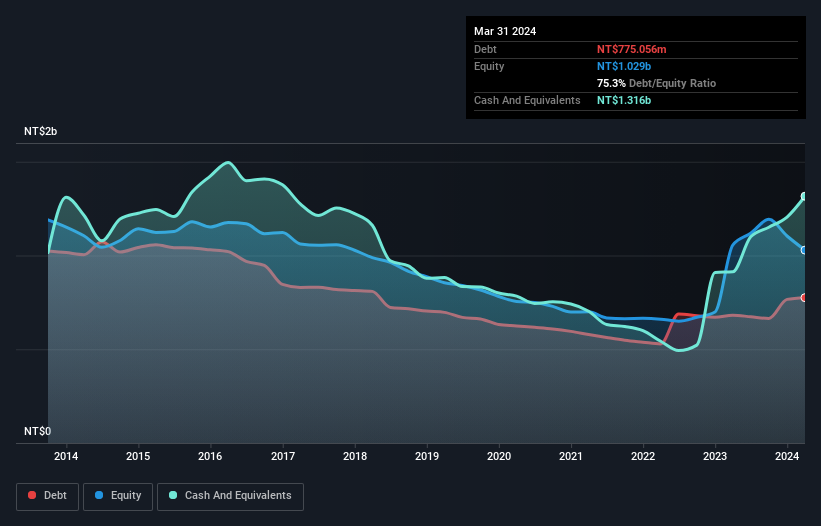- Taiwan
- /
- Electrical
- /
- TWSE:3308
Health Check: How Prudently Does Bestec Power Electronics (TWSE:3308) Use Debt?

Legendary fund manager Li Lu (who Charlie Munger backed) once said, 'The biggest investment risk is not the volatility of prices, but whether you will suffer a permanent loss of capital.' So it might be obvious that you need to consider debt, when you think about how risky any given stock is, because too much debt can sink a company. As with many other companies Bestec Power Electronics Co., Ltd. (TWSE:3308) makes use of debt. But should shareholders be worried about its use of debt?
What Risk Does Debt Bring?
Generally speaking, debt only becomes a real problem when a company can't easily pay it off, either by raising capital or with its own cash flow. Ultimately, if the company can't fulfill its legal obligations to repay debt, shareholders could walk away with nothing. However, a more frequent (but still costly) occurrence is where a company must issue shares at bargain-basement prices, permanently diluting shareholders, just to shore up its balance sheet. Of course, the upside of debt is that it often represents cheap capital, especially when it replaces dilution in a company with the ability to reinvest at high rates of return. When we examine debt levels, we first consider both cash and debt levels, together.
Check out our latest analysis for Bestec Power Electronics
How Much Debt Does Bestec Power Electronics Carry?
As you can see below, at the end of March 2024, Bestec Power Electronics had NT$775.1m of debt, up from NT$681.8m a year ago. Click the image for more detail. However, its balance sheet shows it holds NT$1.32b in cash, so it actually has NT$541.1m net cash.

How Healthy Is Bestec Power Electronics' Balance Sheet?
Zooming in on the latest balance sheet data, we can see that Bestec Power Electronics had liabilities of NT$711.8m due within 12 months and liabilities of NT$354.4m due beyond that. Offsetting this, it had NT$1.32b in cash and NT$49.3m in receivables that were due within 12 months. So it can boast NT$299.3m more liquid assets than total liabilities.
It's good to see that Bestec Power Electronics has plenty of liquidity on its balance sheet, suggesting conservative management of liabilities. Because it has plenty of assets, it is unlikely to have trouble with its lenders. Simply put, the fact that Bestec Power Electronics has more cash than debt is arguably a good indication that it can manage its debt safely. There's no doubt that we learn most about debt from the balance sheet. But you can't view debt in total isolation; since Bestec Power Electronics will need earnings to service that debt. So when considering debt, it's definitely worth looking at the earnings trend. Click here for an interactive snapshot.
Over 12 months, Bestec Power Electronics made a loss at the EBIT level, and saw its revenue drop to NT$409m, which is a fall of 19%. That's not what we would hope to see.
So How Risky Is Bestec Power Electronics?
While Bestec Power Electronics lost money on an earnings before interest and tax (EBIT) level, it actually booked a paper profit of NT$51m. So when you consider it has net cash, along with the statutory profit, the stock probably isn't as risky as it might seem, at least in the short term. With mediocre revenue growth in the last year, we're don't find the investment opportunity particularly compelling. The balance sheet is clearly the area to focus on when you are analysing debt. However, not all investment risk resides within the balance sheet - far from it. For example, we've discovered 4 warning signs for Bestec Power Electronics that you should be aware of before investing here.
Of course, if you're the type of investor who prefers buying stocks without the burden of debt, then don't hesitate to discover our exclusive list of net cash growth stocks, today.
If you're looking to trade Bestec Power Electronics, open an account with the lowest-cost platform trusted by professionals, Interactive Brokers.
With clients in over 200 countries and territories, and access to 160 markets, IBKR lets you trade stocks, options, futures, forex, bonds and funds from a single integrated account.
Enjoy no hidden fees, no account minimums, and FX conversion rates as low as 0.03%, far better than what most brokers offer.
Sponsored ContentValuation is complex, but we're here to simplify it.
Discover if Bestec Power Electronics might be undervalued or overvalued with our detailed analysis, featuring fair value estimates, potential risks, dividends, insider trades, and its financial condition.
Access Free AnalysisHave feedback on this article? Concerned about the content? Get in touch with us directly. Alternatively, email editorial-team (at) simplywallst.com.
This article by Simply Wall St is general in nature. We provide commentary based on historical data and analyst forecasts only using an unbiased methodology and our articles are not intended to be financial advice. It does not constitute a recommendation to buy or sell any stock, and does not take account of your objectives, or your financial situation. We aim to bring you long-term focused analysis driven by fundamental data. Note that our analysis may not factor in the latest price-sensitive company announcements or qualitative material. Simply Wall St has no position in any stocks mentioned.
About TWSE:3308
Bestec Power Electronics
Engages in the design, fabrication, marketing, and sale of switching power supply products worldwide.
Slight with mediocre balance sheet.
Market Insights
Community Narratives


